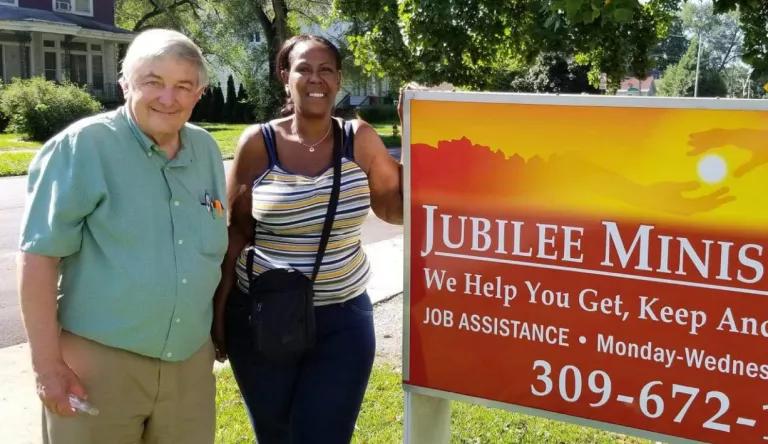Just Transition: Jubilee Ministries Brings More Than Jobs

This is the second in a series of monthly blogs celebrating the grant projects funded through our Clean Air Act settlement with the owners of the E.D. Edwards coal-fired power plant outside Peoria, Illinois. The settlement provides for the plant to close by the end of 2022 and makes $8.6 million available for local job training, lung-health, energy-efficiency, solar-energy, and bus-electrification projects. Each blog features the great work one of the settlement grantees is doing to promote public health and quality of life in the Peoria, Illinois area. Our first blog showcases the new settlement-funded solar array on Peoria's Romain Arts and Culture Community Center.
Jubilee Ministries works under an old adage: that sometimes the best way to help people is to help them help themselves. A faith-based non-profit established in 1989, Jubilee supports Peoria-area residents in their efforts to find, keep, and advance in jobs around the region. Like many job-assistance organizations, Jubilee matches people to jobs and identifies training opportunities that can advance their careers. But Jubilee is unique in that it also provides cash assistance: $50 stipends to help people with job-related expenses, such as steel-toed boots, uniforms, and bus passes.
“For many people, the stipend is what brings them to us,” said Robert Kaiser, President of Jubilee Ministries. “It’s the support they need to follow through with securing or starting a new job. And it’s the carrot that gets them to our door so we can help them find targeted job training that will get them up to a living wage, $20 per hour, job.”
Edwards settlement monies will fund a two-year expansion to Jubilee’s job-assistance program. The program focuses on serving residents in some of Peoria’s poorest and most underemployed neighborhoods, in the shadow of the Edwards plant. The grant funds will go to stipends, transportation assistance, and expanding Jubilee’s job-coaching and -placement services.
Jubilee’s work furthers our goal of supporting Peoria’s just and equitable transition away from a fossil-fueled economy. A just and equitable transition means working to serve the needs of both displaced plant workers and the communities neighboring the plant. These are largely lower-income communities of color, who for decades bore the brunt of the plant’s illegal and deadly soot pollution and will share in the economic repercussions of the plant’s closure. Job-assistance programs like Jubilee’s are critical to building the foundation for a thriving post-coal economy.
A prolific job-assistance program
Jubilee has already put its grant funds to good use. Since June 2020, Jubilee has provided around 450 job-assistance stipends to Peoria-area residents, many of whom were displaced from jobs by COVID; placed more than 100 residents in new jobs; and arranged for hundreds more to participate in Illinois Central College’s Workforce Equity Initiative, a paid job-training program designed to provide a targeted education that leads to a living wage job.
Jubilee’s approach is particularly well-suited to the Peoria job market, where entry-level workers are in high demand for manufacturing and other jobs. Employers are more willing to hire people who have been out of the work force, including returning citizens. But this population is also the least likely to know about these opportunities, and to have the means to pay for the clothes, tools, and other equipment they’ll need to clock in for the first shift. Jubilee helps fill these gaps, working closely with trusted job-placement and temp firms. And once Jubilee has matched someone to an entry-level or temporary job, they start working to identify training opportunities to build the skills for a living wage career
“Seeing the community do better during these hard times.”
Angela Smith, who is Jubilee’s office manager and handles much of its job-coaching work, sees Jubilee’s and its clients’ persistence as the key to success. “This work can be challenging. But as long as we keep pressure on those who seek our help, keep working with them, and never quit on them, we can help them find the success they seek.” There can be—and often are—setbacks. Each person Jubilee serves is different. Sometimes a particular job or training program does not work out. What’s important, according to Angela, is that Jubilee is there at every step to encourage, advise, and offer the help necessary to keep the person on the path to full-time, gainful employment.

Angela shared the story of a man who came to Jubilee after having trouble finding and keeping work. He had a record and did not have a GED. Jubilee found him temporary work and also helped him enroll in commercial driver’s license training. Less than a year after finishing his training, he owns several trucks and a trailer, and employs other drivers. His success also made it possible for his long-term partner to attend nursing school full time.
In the end, for Angela, this work is all about “seeing the community do better during these hard times.” We’re grateful for the opportunity to support Angela, Bob, and the whole Jubilee team as they help people in the Peoria area find and grow through jobs that suit them, and we look forward to celebrating their continued success in the coming years.



